Candidates’ Biographies
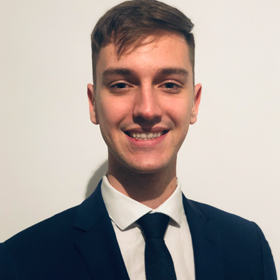
Jean-Nicolas Bordeleau
Jean-Nicolas Bordeleau is a graduate student in political science at the University of Montreal. He is a student member of the Canada Research Chair in Electoral Democracy and the Centre for the Study of Democratic Citizenship (CSDC). He holds a B.A. (Hons) in Political Science from the Royal Military College of Canada, where he received a research internship with the Centre for International and Defence Policy (CIDP) at Queen’s University (2020-2021). Jean-Nicolas’ research fits broadly in the fields of political psychology and comparative politics. More precisely, his work is concerned with democratic stability and electoral integrity. His recent projects have examined citizens’ perceptions of electoral fairness and the impact of election misinformation on voter participation. His research has been published in Democracy & Security and with the International Institute for Democracy and Electoral Assistance, and has received awards from the Canadian Psychological Association as well as recognition from the American Political Science Association. Jean-Nicolas is standing for election for the position of Student Representative for the 2022 CPSA Board of Directors elections. He believes that student representation in CPSA is crucial to the nurturing of Canada’s next generation of political scientists. In this role, Jean-Nicolas would aim for a closer collaboration between CPSA, scholars, and students through a mentoring program and student-led CPSA workshops and events. He hopes to represent students from all backgrounds, levels, and subfields in Canada’s two official languages.

Nikola Brassard-Dion
Nikola Brassard-Dion is a public servant in the Privy Council Office (PCO). Ph.D. in Political Science from the University of Ottawa (2020), he has been the Senior Policy Analyst for Federalism and Constitutional Affairs at the Intergovernmental Affairs Secretariat since 2020. The Secretariat serves as a center of expertise on Canadian intergovernmental relations and provides advice to the Prime Minister and Cabinet to foster a spirit of cooperation and healthy relations between levels of government. Nikola's role in a central agency allows him to develop an important network across the various departments of the federal public service. In seeking a position within CPSA, Nikola hopes to bridge the gap between political science research and public policy development, which he currently does by organizing conferences at PCO on priority issues related to Canadian federalism. This position would also allow him to mobilize the knowledge of his fellow public servants to address the benefits, challenges and policy considerations of a practitioner at CPSA conferences. He hopes to represent all CPSA practitioner members who work in government, community, civil society organizations and the private sector. Nikola was the recipient of the Forum of Federations/Centre on Governance Doctoral Fellowship in Federalism (2020) and the Social Sciences and Humanities Research Council Doctoral Fellowship (2016). His work has appeared in Elsevier (2022), McGill-Queen's (2021), and the Canadian Journal of Law and Society (2017).
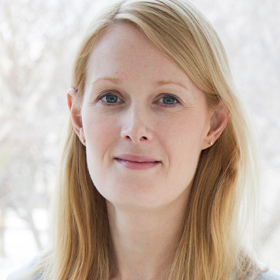
Kirsten Fisher
Kirsten Fisher is an Assistant Professor of Political Studies at the University of Saskatchewan. A political theorist by training, Kirsten operates across traditional disciplines and subfields, working on issues of global governance and human rights, international criminal law, politics and the International Criminal Court (ICC), justice after atrocity, and post-conflict social reconstruction, particularly in Africa. Her research has been published in various outlets, including the Canadian Journal of Political Science, International Criminal Law Review, Contemporary Political Theory, Journal of Modern African Studies, and Journal of International Political Theory. She is the author of Moral Accountability and International Criminal Law (2012) and Transitional Justice for Child Soldiers (2013), and is the co-editor/co-author of Transitional Justice and the Arab Spring (2014). Prior to heading to the Canadian prairies, Kirsten held research positions in the Department of Political Science at McGill University, the Centre of Excellence in Global Governance Research at the University of Helsinki, and the Human Rights Research and Education Centre at the University of Ottawa. Having been an active participant at the CPSA annual conference for years, she is standing in this election in hopes of getting the opportunity to use her extensive experience on boards and committees (academic and non-profit) to contribute to a greater degree to the Canadian political science community.
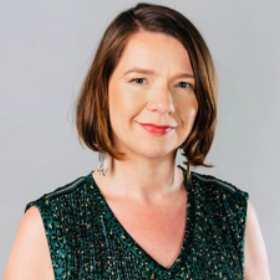
Aude Claire Fourot
Aude Claire Fourot is an Associate Professor of Urban Studies and Political Science at Simon Fraser University in British Columbia. She works in both official languages of Canada on the unceded Traditional Coast Salish Lands including the Tsleil-Waututh (səl̓ilw̓ətaʔɬ), Kwikwetlem (kʷikʷəƛ̓əm), Squamish (Sḵwx̱wú7mesh Úxwumixw) and Musqueam (xʷməθkʷəy̓əm) Nations. Her research lies at the intersection of public policy, comparative politics and Canadian politics, with particular focus on the local level. Her current work deals with issues related to international migration in cities and towns, both in Canada and Europe. Aude-Claire has been a member of the CPSA for many years and was a jury member of the 2019 Vincent-Lemieux Prize and the 2016 ACSP Prize for Comparative Politics. She now wishes to become more involved in the Association by running for election to the Board of Directors. She has three specific areas where she would like to put her efforts. One is work on items related to CPSA’s equity, diversity, inclusion, and decolonization initiatives. Another area she would like to develop relates to projects aiming at ensuring that the discipline values theoretical and methodological pluralism. This could open political science to both other disciplines and a body of knowledge produced in languages other than English. The third activity that she is committed to is being active in supporting and developing mentoring activities, especially issues important for international students.
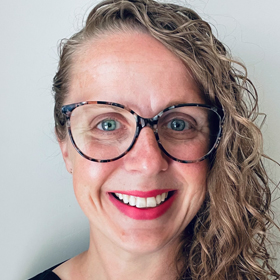
Megan Gaucher
Megan Gaucher is an Associate Professor in the Department of Law and Legal Studies at Carleton University. She received her PhD in Political Studies from Queen’s and her research focuses on the intersections between citizenship, family and belonging in Canadian immigration and refugee law, policy and politics. Her work has been published in various journals including the Canadian Journal of Political Science, International Journal of Canadian Studies, Canadian Ethnic Studies, and Social Politics: International Studies in Gender, State & Society, and her book A Family Matter was recognized by both CPSA (2019) and APSA (2020). In addition to being an active member in CPSA for close to fifteen years, Megan has served as chair and/or discussant on multiple CPSA panels, co-organized several CPSA workshops, and was the Law and Public Policy Section Head for the 2021 Annual Conference. Inspired by the meaningful, transformative work her peers on the CPSA Board of Directors, CPSA Reconciliation Committee, and the CPSA EDID Committee have undertaken over the past several years, Megan is standing for election to the CPSA Board of Directors to use her experience as an interdisciplinary scholar to assist with these efforts and to continue working towards making CPSA and Canadian political science an accessible space of inquiry and community.
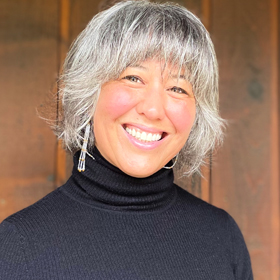
Genevieve Fuji Johnson
Genevieve Fuji Johnson is a Yonsei settler of Japanese and Irish ancestry. Although proud of her family’s history of resilience, she is reckoning with their four generations of Indigenous displacement. It is thus with gratitude and respect that she divides her time between the traditional and unceded territories of the Musqueam, Squamish, and Tsleil-Waututh Nations and those of the Tla-o-qui-aht Nation. Dr. Johnson is a professor of Political Science at SFU. Genevieve is author of Democratic Illusion (UTP, 2015) and Deliberative Democracy for the Future (UTP, 2008). With Randy Enomoto, she co-edited Race, Racialization, and Anti-Racism in Canada and Beyond (UTP, 2007). With Kerry Porth, her long-time research collaborator, she is working on a book project – and corresponding graphic novel – that develops a case for solidaristic scholarship serving the justice struggles of sex workers. She has published (or has forthcoming) articles in the Canadian Journal of Political Science, Contemporary Political Theory, Critical Policy Studies, International Feminist Journal of Politics, Journal of Comparative Policy Analysis, Journal of Deliberative Democracy, Policy & Politics, Policy Sciences, Qualitative & Multi-Method Research Newsletter, and Social Sciences Quarterly. Genevieve was Senior Advisor to the Provost’s Office on Faculty Inclusion, Diversity, and Engagement at SFU. She has served on the board and executive committee of the CPSA, executive committee of SFU’s Faculty Association, and board of the Downtown Eastside Women’s Centre (DEWC). She was President of DEWC from 2017-2020. She is Treasurer of Surfrider Foundation, Pacific Rim. For many years, she has volunteered for WISH Drop-In Centre. Honored to be nominated for election to the CPSA’s 2022 Board of Directors, she intends to seek appointment to Vice-President.

Katelynn Kowalchuk
Katelynn Kowalchuk is an MA student at the University of British Columbia and will be transitioning into the PhD program in September 2022. She received her BA (Hons.) at the University of Regina in 2020 and completed a Graduate Certificate in Social Economy and Co-operatives at the Johnson Shoyama Graduate School of Public Policy in 2021. Katelynn’s research is based broadly in Canadian and Comparative politics, and includes work on mental healthcare policy, intergovernmental relations, and ideological conflict. At present, she is working on her MA thesis which examines the effects of partisanship and civic-provincial relations on levels of civic autonomy. She is the recipient of the highly competitive SSHRC CGS-M and has been publishing consistently since her commencement in 2020, including an e-book chapter, a first-author article in a graduate student journal, and multiple research briefs. Katelynn has extensive experience serving on representative boards both within and externally from the academy, including the UBC Political Science Graduate Students’ Association (2021-), the Green College Academic Committee (2021-), and the University of Regina Undergraduate Research Journal (2021). She has advocated tirelessly for youth and student issues in these roles, such as mental health and accessibility, and has gained an appreciation for the work that occurs “behind the scenes” in academic organizations. Katelynn’s extensive experience on boards, paired with her advocacy for students and youth, make her an ideal candidate for the position of Student Representative on the CPSA Board of Directors.

Julia Rodgers
Julia Rodgers is a PhD candidate and Part-Time Faculty in Political Science at Dalhousie University. She holds a Bachelor of Arts with a double major in Political Science and Atlantic Canada Studies (honours) and a Master of Arts in Atlantic Canada Studies/Interdisciplinary Studies from Saint Mary’s University in Halifax, NS. Her research focuses on health policy and provincial governance models, particularly community engagement, patient-oriented practices, and the evaluation of collaborative policy deliberation models through the lens of representation and power. Further, she is a dedicated community advocate, acting as a lead author on the Defunding the Police – Defining the Future for HRM report which has been hailed as “the most ambitious blueprint in Canada to divest police budgets and reinvest in community services.” Julia is the current recipient of the CIHR/MSSU Student Research Award, the Nova Scotia Graduate Scholarship for Innovative Research, the Building Research for Integrated Primary Healthcare Doctoral Award, and a Junior Fellow with the MacEachen Institute for Public Policy and Governance. As a graduate student and an Atlantic Canadian, Julia is standing for election to the CPSA Board of Directors to ensure the perspectives of emerging scholars and smaller institutions are heard. Our field runs the risk of becoming stagnant; incorporating a diversity of viewpoints will not only enrich existing practices but also ensure those newly entering the field are reflected and represented.
